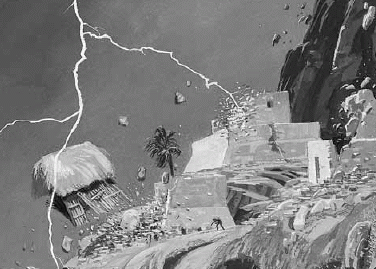Question
Dear Gramps,
I have read in the scriptures before that people were calling the Lord a great and terrible God. I don’t understand that part. If they think He is great, then why did they also call him terrible? I don’t understand that. Thank you.
Randee Marie
Answer
Dear Randee,
I find only one place in the scriptures where the term “great and terrible God” is used, and that is in the book of Nehemiah. It is believed that the Book of Nehemiah was written somewhere around the time between 445 and 433 B.C. To understand the term you refer to, we need to establish the context in which it was expressed. Thus, a bit of history is in order.
You will remember that just fifteen years after Lehi and his family left Jerusalem in 600 B.C., the Jews were taken captive into Babylonia by Nebuchadezzar, who captured Jerusalem and burnt down the temple. Seventy years later, under King Cyrus, the Jews were allowed to return to Jerusalem and rebuild the temple. However, Cyrus died before the temple was completed, and the Jews were hindered in the rebuilding process. Marauding bands would harass the Jews and tear down their work in rebuilding the temple.
Now, not all of the Jews returned to Jerusalem in 515 B.C.; many remained in Babylon. Finally, when Xerxes was king of Babylon, who ruled from 485 to 464 B.C., he had a cup bearer, whose name was Nehemiah. When Nehemiah learned from some Jews that had returned from Jerusalem the sad state of affairs there, and that the walls that they were building around the temple had all been torn down, and that the temple gates had been burned, he wept and mourned and fasted, and poured his heart out to God, as recorded in Nehemiah 1:5-9
I beseech thee, O LORD God of heaven, the great and terrible God, that keepeth covenant and mercy for them that love him and observe his commandments:
Let thine ear now be attentive, and thine eyes open, that thou mayest hear the prayer of thy servant, which I pray before thee now, day and night, for the children of Israel thy servants, and confess the sins of the children of Israel, which we have sinned against thee: both I and my father’s house have sinned.
We have dealt very corruptly against thee, and have not kept the commandments, nor the statutes, nor the judgments, which thou commandedst thy servant Moses.
Remember, I beseech thee, the word that thou commandedst thy servant Moses, saying, If ye transgress, I will scatter you abroad among the nations:
But if ye turn unto me, and keep my commandments, and do them; though there were of you cast out unto the uttermost part of the heaven, yet will I gather them from thence, and will bring them unto the place that I have chosen to set my name there.
Nehemiah is referring to God as “great and terrible” because, as a result of the disobedience of the Children of Israel, he allowed Jerusalem to be destroyed and its people taken captive; all this in fulfillment of the prophecies of Jeremiah, Lehi, and others.
Incidentally, on the same day that Nehemiah had learned all this bad news about Jerusalem and the desecration of the temple, as he was serving King Xerxes at his supper, he told the king the reason for his sorrow, and asked permission to go to Jerusalem to rebuild the wall and the temple. The king granted him permission and gave him authority and men to complete the work.
Gramps







